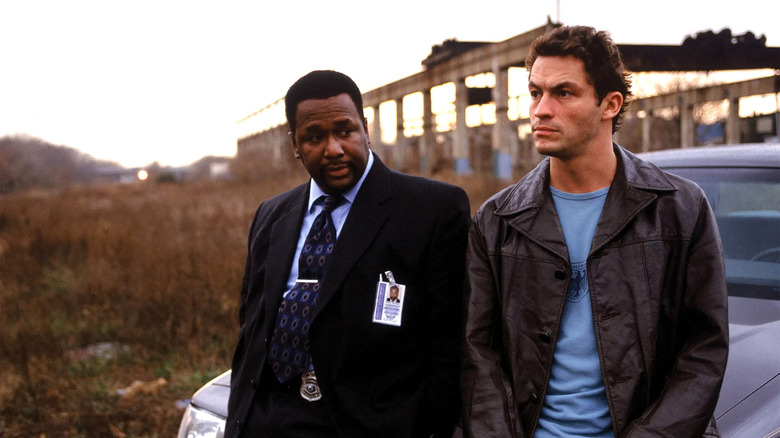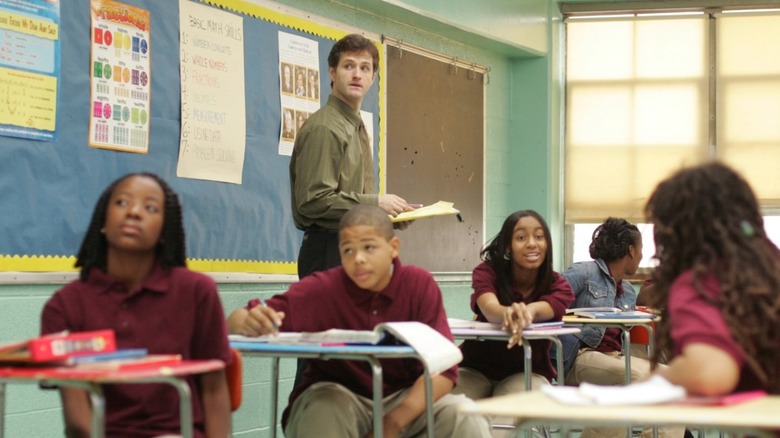The Wire's Creators Weren't Exactly Honest With Their Pitch To HBO
When watching "The Wire," it's easy to wonder just how exactly a show as ambitious as this was ever greenlit in the first place. At a time where episodic television was still the norm, "The Wire" went ahead and made a debut season where each episode followed a million different storylines at once, most of which didn't resolve by the end of the episode. At a time where most hour-long drama episodes would have an A story, a B story, maybe a C story and occasionally a D story, "The Wire" had enough storylines going on its first episode to cover half the alphabet.
And believe it or not, the pilot is "The Wire" at its most simplistic. The episode ends with a main character seeing the dead body of a witness in his court trial from the beginning, and the show includes a quick flashback to the court scene to make sure the audience understands the significance. Showrunner David Simon was reluctant to include the flashback because he thought it made it feel like the show didn't trust its audience, but HBO insisted. David Simon later begrudgingly admitted that the flashback may have been the right call, though, and it makes sense: even with the flashback, the pilot was already asking far more from its audience that most pilot episodes. It introduced us to 40 different named characters within the span of an hour, so it's more than possible that viewers would've forgotten this minor character's name and face by the episode's end.
Flashback or no flashback, this pilot was a tough sell. So how did the creators manage to get HBO to pick up their show? By pretending it was just an unusually thoughtful cop show, rather than a show about an entire city.
Much bolder than expected
"I sold it as a cop show," David Simon told novelist and soon-to-be co-writer George Pelecanos at the time, "but they don't know it's not really a cop show." Many of the actors on the show were under a similar impression: "I expected it to be about wiretapping," Frankie Faison said, who joined the show as deputy commissioner Ervin Burrell.
And at first glance, "The Wire" might very well seem like a cop show. The first season focused on a group of policemen as they investigated a dangerous gang in West Baltimore. But even before the show's shift to the docks in season 2 made it clear the show had much larger ambitions, season 1 had plenty of moments hinting that "The Wire" wasn't interested in the standard cops and robbers storylines. For one thing, season 1 dedicated nearly half its time to storylines from the criminals' perspective, giving them a level of depth and complexity rarely seen or expected on a standard cop show.
It was also surprisingly willing to dive into the bureaucratic side of things. The investigation into the Barksdale gang, for instance, is slow and complicated: it takes six episodes just to set up the wiretap the show got its title from. The writers were uninterested in most of the standard chase sequences and shootouts of other cop shows, to the point where none of the police characters actually fired their gun throughout the entirety of the first season. It was also a lot more critical of the police in general; the second episode of the show featured several of its main police characters engaging in police brutality, with their lieutenant covering it up for them.
A televisual novel
The biggest difference from the standard cop show was the show's patient, slice-of-life pacing. Things were rarely wrapped up neatly by the end of each episode. Instead, each season was paced more like a big 19th century novel like "Bleak House" or "Middlemarch," with a whole bunch of storylines going on at once, all coming together to make larger points about society at large. David Simon described the show as a "novel for television" and went out of his way to hire novelists for his writing team, not typical screenwriters.
"The Wire" was most often compared to the writing of Charles Dickens, but Victor Hugo's "Les Misérables" might actually be the best comparison. Like "The Wire," "Les Mis" was split up into five parts, with each section changing focus to a new part of French (or Baltimorean) society, with the second section in particular being the most jarring. Both works started on a simple premise — for "Les Mis," it was the idea of a man on the run for stealing a loaf of bread — and then constantly expanded the scope, by the end succeeding in presenting its audience with a bird's eye view of an entire society.
Just as Hugo's sudden shift to talking about the Waterloo battle logistics radically (and controversially) changed the scope of his novel, "The Wire's" second season featured a necessary storytelling shift that made it clear, once and for all, what the show was trying to do. As the Guardian put it: "It was with season two, which looked at 'the death of labour,' that Simon made clear his intention to 'build a city.' Otherwise, he told Burns, 'we truly are doing just a cop show.'"


